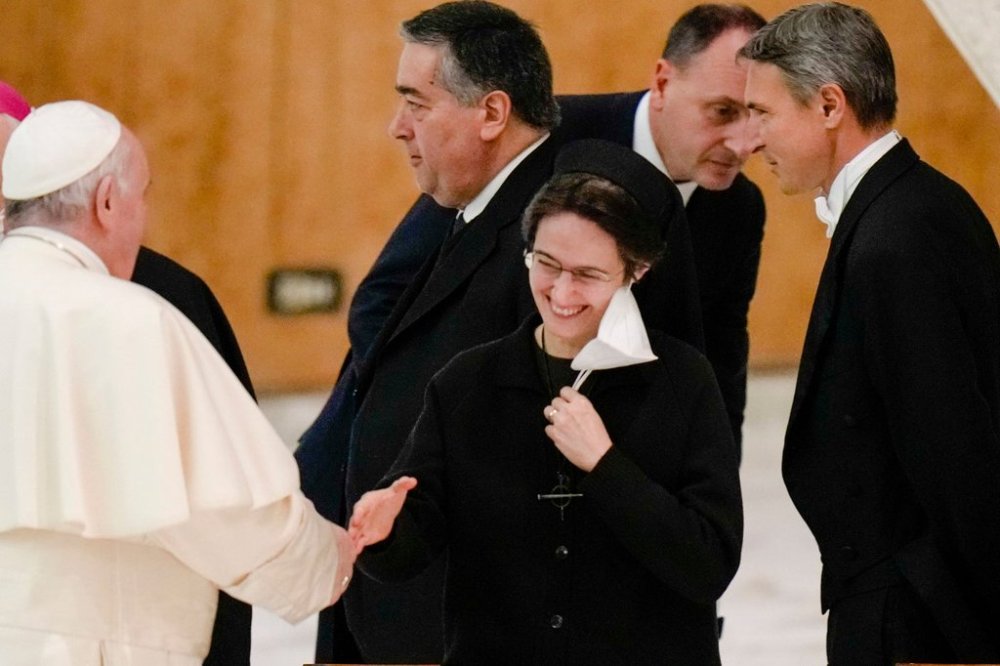Pope tweaks a law allowing a woman to head the Vatican City State, months after a nun was appointed
Advertisement
Read this article for free:
or
Already have an account? Log in here »
To continue reading, please subscribe:
Monthly Digital Subscription
$0 for the first 4 weeks*
- Enjoy unlimited reading on winnipegfreepress.com
- Read the E-Edition, our digital replica newspaper
- Access News Break, our award-winning app
- Play interactive puzzles
*No charge for 4 weeks then price increases to the regular rate of $19.00 plus GST every four weeks. Offer available to new and qualified returning subscribers only. Cancel any time.
Monthly Digital Subscription
$4.75/week*
- Enjoy unlimited reading on winnipegfreepress.com
- Read the E-Edition, our digital replica newspaper
- Access News Break, our award-winning app
- Play interactive puzzles
*Billed as $19 plus GST every four weeks. Cancel any time.
To continue reading, please subscribe:
Add Free Press access to your Brandon Sun subscription for only an additional
$1 for the first 4 weeks*
*Your next subscription payment will increase by $1.00 and you will be charged $16.99 plus GST for four weeks. After four weeks, your payment will increase to $23.99 plus GST every four weeks.
Read unlimited articles for free today:
or
Already have an account? Log in here »
ROME (AP) — Pope Leo XIV fixed a technical glitch on Friday in a Vatican law that became problematic after Pope Francis named the first-ever woman to head the Vatican City State administration.
Leo amended the 2023 law to remove a reference that had said the president of the Vatican City State administration must be a cardinal.
Francis in February appointed Sister Raffaella Petrini, a 56-year-old Italian nun, as president of the city state. The appointment was one of many Francis made during his 12-year papacy to elevate women to top decision-making jobs in the Vatican, and it marked the first time a woman had been named governor of the 44-hectare (110-acre) territory in the heart of Rome.

But the appointment immediately created technical and legal problems that hadn’t existed before because Petrini’s predecessors had all been priestly cardinals.
For example, Petrini wasn’t invited to deliver the economic status report of the Vatican City State to the closed-door meetings of cardinals in spring that preceded the May conclave that elected Leo.
Normally, the cardinal-president of the Vatican City State would have delivered the briefing. But those pre-conclave meetings, known as general congregations, are for cardinals only.
In changing the law Friday to allow a non-cardinal to be president of the Vatican administration, Leo suggested that Petrini’s appointment was not a one-off. He wrote that the governance of the territory was a form of service and responsibility that must characterize communion within the church hierarchy.
“This form of shared responsibility makes it appropriate to consolidate certain solutions that have been developed so far in response to governance needs that are proving increasingly complex and pressing,” Leo wrote.
Petrini’s office is responsible for the main revenue sources funding the Holy See coffers, including the Vatican Museums, but it also handles the infrastructure, telecommunications and healthcare for the city state. The Vatican City State commission she heads is responsible for approving laws governing the territory, and approving the annual budgets and accounts.
The Catholic Church reserves the priesthood for men. While women made strides in reaching top management jobs in the Vatican during Francis’ pontificate, there was no movement or indication that the all-male hierarchy would change rules barring women from ministerial ordination.
___
Associated Press religion coverage receives support through the AP’s collaboration with The Conversation US, with funding from Lilly Endowment Inc. The AP is solely responsible for this content.
The Free Press acknowledges the financial support it receives from members of the city’s faith community, which makes our coverage of religion possible.


